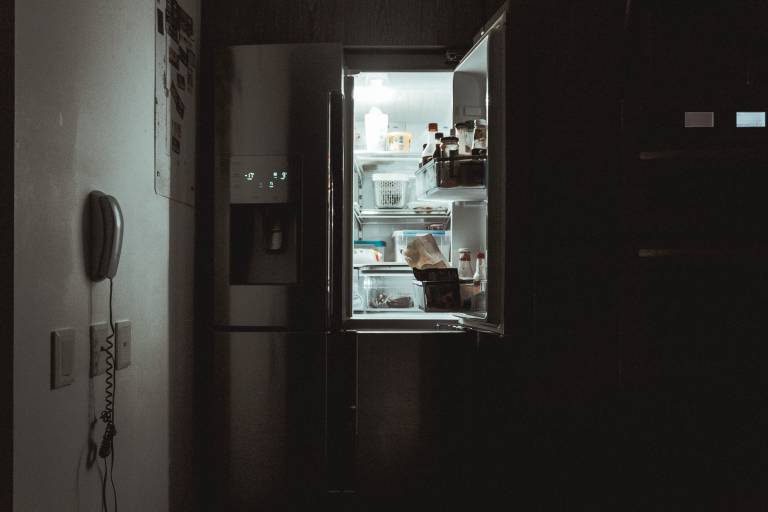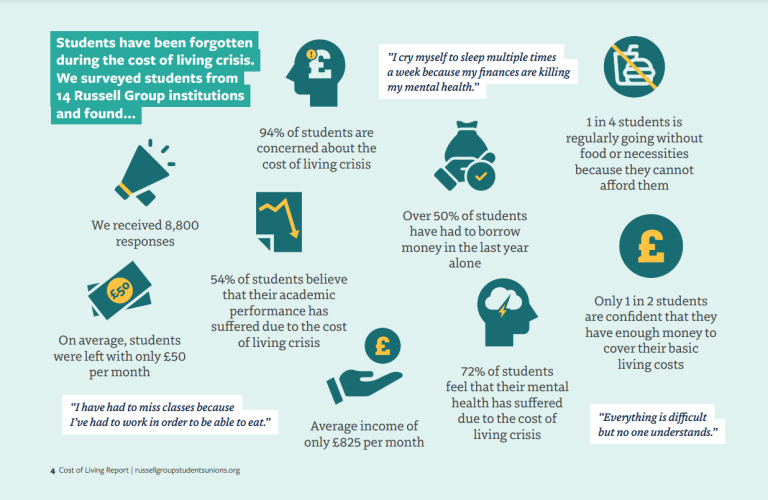What are the real effects of the cost-of-living crisis on students?
17 March 2023
In an in-depth and vital report, UCL student journalist Camille Koebel investigates how the cost-of-living crisis is affecting students' mental and emotional health, in the wake of the new Russell Group universities' Cost-of-Living Survey.

It is a grim and overwhelming reality; one that keeps us up at night, shown in each new layer of blankets where hopes of warm sleep are swept away by worries, loneliness and stress. A new cost-of-living survey of 8,800 university students, carried out by Russell Group universities Students’ Unions, shows that the crisis has brought students to their knees, with almost a third living off £50 a month after paying rent and bills. One in 5 students in London has been forced to increase their working hours or even take up a second job, and 68% say they can’t afford course material.
“ The cost-of-living crisis has brought students to their knees, with almost a third living off £50 a month after paying rent and bills.
This comes as no surprise when, while the UK faces rising inflation above 10%, the UK government fails to increase loans significantly. On 11 January, the government announced a 2.8% increase in loans for the 2023/24 academic year – a barely symbolic measure when the DfE pointed out that a 14% rise would be needed to simply keep up with the cost of living.
As one student says: “I don’t qualify for most bursaries or university support due to parental income (which also means lower student finance loans), but my parents cannot afford to give me enough money to complement my low student loan to a point where I’d have enough money to survive”. Some universities have indeed pointed to this issue, as the parental earning threshold of £25,000 has remained the same since 2008.
While the vast majority of students are impacted by the cost-of-living crisis (81%, according to the Russell Group Cost-of-Living Survey), the most affected are those from low socio-economic backgrounds, international students, and those of us with dependents – all affected in different ways. International students are unable to increase working hours due to visa restrictions and often have a harder time accessing funds: “I have a big stamp in my visa," one student says, "that says that I have no access to public funds”.
Students with dependents – often women – are also at great risk of precarity, and have the additional cost of childcare. A recent review of the UCL Institute of Health Equity on the rising cost of living recommended that “local employers should provide subsidised on-site childcare where feasible, offer childcare deposit loan schemes and ensure flexible working options for parents at all levels of their organisations to help address both the high cost of childcare and child poverty in London.” While UCL does have a day-care service for students and staff, its limited capacity (67 places), which can cost up to £1,522 a month, may not be able to help all those who would welcome such a service on campus.

In response to the crisis, UCL increased the amounts of its bursaries and grants. At the start of this academic year, the undergraduate bursary was augmented by £500. UCL’s Financial Assistance Award, which prioritises those with children and / or with disabilities – and which can grant up to £3,000 – had its assessment process adapted to consider inflationary increases. This means that around £1.5m of extra funding will be available this year, with £500,000 already disbursed in non-repayable grants. For those in urgent need, the Sarah Douglas Hardship Fund managed by the Students’ Union UCL Advice Service provides short emergency grants of up to £150, as well as grants of up to £3,000 (the latter taking several weeks to process, and the former covering short-term support in the meantime). The Student Funding Advisors and the Students’ Union Advice Service can both help students find out what funding they can claim and how to put together an application.
Both the Student Funding Advisory service and the wider Student Funding Office are completely confidential: “We would never discuss a student’s financial information with their parents, unless the student has given us written permission to do so”.
Even though the Funding Office received more than double the number of hardship applications this year compared to last year, they still mention that “one of the hardest parts of the job is simply encouraging students to come forward to ask for help. It can be embarrassing and difficult for students to disclose that they are struggling financially. In some cases, students have a misconception that they have to be utterly destitute before they can apply for extra money – and that simply isn’t the case. It's much better to apply before things get really dire so we can provide timely support”.
Apart from putting students at greater risk of precarity, the cost-of-living crisis presents threats to students’ mental health and overall wellbeing. Students report: “I can never go out with my friends and peers because everything is so expensive, so I sit at home alone. Being in a foreign country for the first time, away from family and friends, is already lonely enough,” and, “as someone with both a chronic illness and mental health issues, the cost-of-living crisis has severely affected my academic life. I have been unable to join any clubs or societies which has left me feeling isolated," as well as, “since food and beverages in London are so expensive, I avoid going out with my friends. Fewer opportunities to socialise make me feel isolated from the class and society.”
““I can never go out with my friends and peers because everything is so expensive, so I sit at home alone. Being in a foreign country for the first time, away from family and friends, is already lonely enough.
It is clear from these students’ testimonies (all from the Russell Group SU Cost-of-Living Poll) that one of the main consequences of the soaring cost of living is being isolated and lonely. While university is advertised as the time of your life, where you meet lifelong friends, the reality of the past few years, first with the pandemic, now with surging inflation, is that it is becoming an increasingly isolating and lonely experience – one made even harder by the way in which expectations and reality can clash. Going out in London is particularly expensive, and societies’ costs can quickly add up.
To foster students socialising and discovering themselves within society activities, earlier this year the Students’ Union created a participation fund, which any student can apply to, and which is aimed at covering societies’ costs (e.g. memberships, purchasing equipment, or joining Bloomsbury Fitness) up to £250.
Alongside isolation and loneliness, students are also subject to further stress and worries: “The transport costs & bills genuinely keep me up at night”; they say, as well as: “when I go by train I see homeless people sitting in the stations and I'm afraid I will be just like them one day.”
A NUS survey reports that 90% of students say the crisis has an impact on their mental health, with 31% of them reporting a “major impact”. However, the same survey points out that only 20% have received support from the Government.

Even when it may seem useless, accessing help and support is important. UCL and the SU have many wellbeing services. From a support line available 24/7, to counselling services – aid is available. The Student’s Union also has advisors ready to help students navigate issues ranging from housing and employment to legal issues in complete confidentiality.
“UCL and the SU have many wellbeing services. From a support line available 24/7, to counselling services – aid is available. The Student’s Union also has advisors ready to help students navigate issues ranging from housing and employment to legal issues in complete confidentiality.
The Student Support and Wellbeing Team also often organise events and themed weeks to highlight some issues and bring students together; like with their legendary Wobble Week in November and their Beat the Blues week in January. The SSW team also planned a LGBTQ+ Students’ mental health workshop in late February, University Mental Health Day was on March 9, and a special week dedicated to exam stress is in the works.
Greater precarity and poor mental health transform the cost-of-living crisis into a cost-of-learning crisis, with 53% of UCL students saying that their academic performance has suffered. This situation is multifactorial. The higher costs of living and difficult access to financial help are forcing students to work more hours to make ends meet, leaving their studies on the side: “I have to have a part-time job, which has hurt my grades from the start of uni, and I am now considering increasing my hours and letting my grades fall due to the cost of living.”
Increased travel costs also mean that students who can’t afford rent near the university have to choose wisely when to come to university: “[For] some lab techniques […] you have to go in every day; I can’t afford to spend £11.50 on travel just to go in for 30 mins max work," says one, whilst another says, “I've sometimes skipped 9ams just to save on the peak transport fee.”

Image from the Russell Group Students' Unions Student Cost of Living Report, March 2023
Increased financial stress also jeopardises students’ ability to study in good conditions and focus on their work: “I am growing more and more concerned with the workload and constantly don’t have sufficient time to do well in any sphere of my life – academic, professional or personal and social. It has become impossible to get more than 6 hours of sleep, and with the constant worry I find myself stuck, having to balance what I need with investing in my future.”.
It is clear from looking at the statistics and listening to students’ voices that this situation is damaging. It puts students – a particularly precarious group – under great stress. The Russell Group Students' Unions Cost of Living survey reports that 21% of UCL students have considered deferring their studies because they could not afford to continue and 18% have considered dropping out: “I was thinking about dropping the program and go back to my country, because the circumstances here are unbelievably terrible.”
If this situation lasts – and support remains limited – the crisis could threaten academic achievements and excellence in the longer run, with the most impacted students being prevented from performing at their best. Eventually, the most impacted ones – likely from lower socio-economic backgrounds – might need to drop out because of the financial unsustainability and inaccessibility that come with university life. Further along the line, this could mean even greater entry selection, with fewer and fewer people able to afford to go to university at all.

It is important to speak about the cost-of-living crisis, and how it’s affecting us all, because students should not suffer in silence. Opening up the discussion about it, letting students know of the help they can get at UCL – so they don’t suffer in silence – is important to prevent further harm and isolation.

About the author:
Camille Koebel is a 2nd year student in the European Social and Political Studies BA programme at UCL. She sees the UCL VPEE Student Journalism Scheme as a great opportunity to hone the skills required for a career in this field. She is looking forward to writing for UCL News to provide students with articles that feel relevant to their experiences, aspirations, and life, giving them a voice and helping them make the most out of UCL!
Find out more about the UCL Student Journalism Scheme here.
 Close
Close

